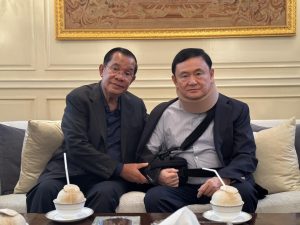Yesterday, former Thai Prime Minister Thaksin Shinawatra received his first foreign visitor since his parole and release from detention over the weekend: Cambodia’s former prime minister, Hun Sen.
The 71-year-old former leader flew to Thailand on a private jet and drove to the Shinawatra family compound in western Bangkok in a Maybach limousine for a visit that lasted just under two hours.
During the meeting, which was also attended by Thaksin’s daughter Paetongtarn, the pair claimed not to have discussed politics. “Two former prime ministers met and didn’t talk about politics, we just reminisced about 32 years of friendship,” Hun Sen posted on Facebook, alongside images of him sitting on a sofa next to Thaksin, still wearing the neck brace and sling that he wore during his release on February 18.
“To strengthen our friendship, I invited Pheu Thai Party leader Paetongtarn Shinawatra to pay an official visit to Cambodia on March 14 and 15,” he added.
Thaksin, who was overthrown in a coup in 2006, was released after serving six months of an eight-year prison sentence for corruption-related charges that prompted him to flee the country in 2008. His return and rehabilitation were made possible by the new alliance that the Thaksin-aligned Pheu Thai Party and the forces of the conservative establishment made after last year’s general election.
As perhaps the most prominent players in their countries’ recent political history, albeit from abroad in Thaksin’s case, the two politicians have shared a lot of history. Hun Sen welcomed the fugitive billionaire to Cambodia on a number of occasions during his 15 years of self-exile, and quietly provided a sanctuary to prominent “red shirt” activists who fled Thailand after the 2006 coup. In 2009, Hun Sen named Thaksin a special economic advisor, riling up Thai nationalist opinion, and prompting claims of interference in Thailand’s internal affairs.
While this dalliance was convenient for both men – it gave Thaksin a nearby base for organizing his political forces, and allowed Hun Sen to stick his finger in the eye of the Democrat-led government in Bangkok during the 2008-2011 stand-off over Prasat Preah Vihear, an Angkorian temple perched on the two countries’ border – a genuine friendship does seem to have sprung up between them. In August, a couple of weeks prior to his return to Thailand, Thaksin attended a birthday party for Hun Sen, just days before the Cambodian leader handed the prime ministership to his son Hun Manet after nearly four decades in power.
The meeting of the two political titans also called to mind less savory aspects of the bilateral relationship. Ahead of Hun Sen’s arrival yesterday, Sitanan Satsaksit, the elder sister of the missing pro-democracy activist Wanchalearm Satsaksit, attempted to reach Thaksin’s mansion to demand answers about his whereabouts, but was blocked by police. Deputy National Police Chief Surachate Hakparn reportedly arrived at the scene, and told Stanan that she couldn’t approach Thaksin’s mansion because a VIP of “national importance” was there.
An activist affiliated with Thailand’s “red shirt” United Front for Democracy against Dictatorship, who fled to Cambodia after the military coup of 2014, Wanchalearm was abducted by a group of armed men in June of 2020, from his apartment building in the Cambodian capital Phnom Penh.
His disappearance signified not only that Cambodia’s one-time status as a “red shirt” sanctuary was a product of political expediency; it also hinted at the increasing coordination between the governments of the Mekong region to ensure that dissidents cannot use each other’s countries as a base of operations. According to the Thai Enquirer, Wanchalearm was the ninth exiled critic of Thailand’s military and royal institution to fall victim to enforced disappearance between 2014 and 2020.
The Cambodian government denies any knowledge or involvement in Wanchalearm’s disappearance, repeatedly telling his family, foreign diplomats, and United Nations agencies that there is no evidence of its involvement, despite eyewitnesses claiming that some of the abductors were speaking Khmer. Indeed, Cambodian officials repeated these claims this week to the U.N. Committee on Enforced Disappearances.
Yet it is undeniable that the friendship between the Thai and Cambodian governments has led to both nations becoming increasingly inhospitable to dissenters and exiles.
Earlier this month, Thai authorities arrested three Cambodian dissidents in Thailand, ahead of the state visit by Hun Manet on February 7. Kung Raiya, Phan Phana, and Lim Sokha, who had all been designated persons of concern by the United Nations refugee agency, were reportedly planning to hold a public protest to coincide with Manet’s arrival.
Following his meeting with Thai Prime Minister Srettha Thavisin, Hun Manet subsequently thanked him for “not allowing Thai territory to be used for any activities for interference in Cambodian internal politics.”
“The Cambodian government also gives its commitment for not allowing Cambodia’s soil as land for conducting activities to interfere with Thailand or causing issues in Thailand,” he added, standing alongside Srettha at a joint news conference.

































